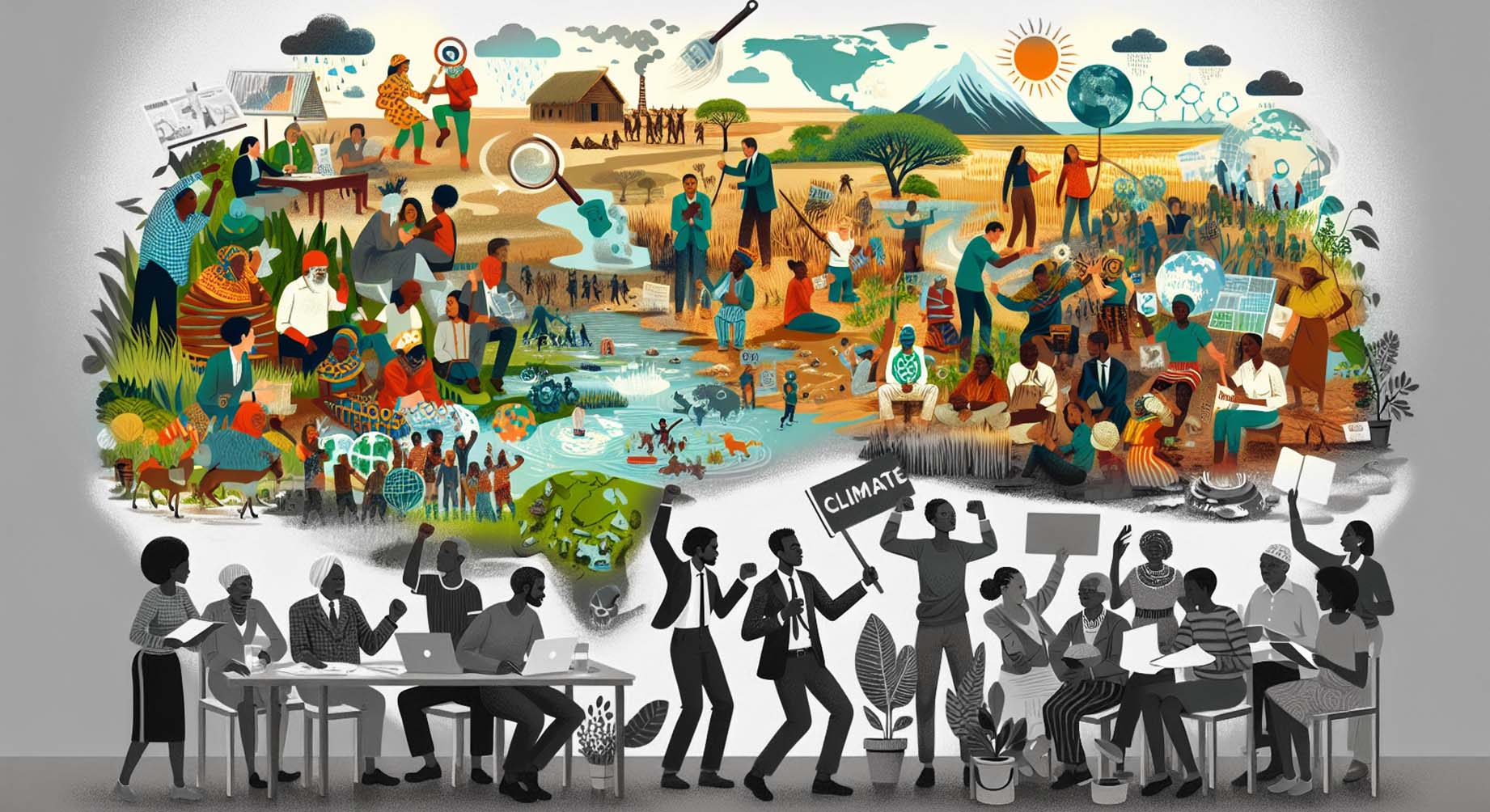

Climate Justice and Gender Inclusion in Africa – Wilifrida Sisti John
What is climate justice and why does it matter?
Climate change is a “threat multiplier”, it escalates social, political and economic tensions in fragile and conflict-affected settings. As climate change drives conflict across the world, women and girls face increased vulnerabilities to all forms of gender-based violence, including conflict-related sexual violence, human trafficking, child marriage, and other forms of violencei
Climate justice means putting equity and human rights at the core of decision-making and action on climate change.iiIs a term, and more than that a movement, that acknowledges climate change can have disproportionately harmful social, economic, and public health impacts on disinvested populations. Advocates for climate justice are striving to have these inequities addressed head-on through long-term mitigation and adaptation strategies.iii
There are many facets to climate justice. Below, we provide an overview of a few of them.
- Structural inequalities: Even within the same country, the impacts of climate change may be felt unevenly due to structural inequalities based on race, ethnicity, gender, and socioeconomic status. Women are more severely affected by climate change impacts,iv because they have access to fewer resources to adapt and cope with abrupt changes.
- People with disabilities, are at increased risk of the adverse impacts of climate change, including threats to their health, food security, and access to water energy, and sanitation, and livelihoods, particularly in developing countries.v
- Indigenous Peoples, who protect 80 percent of the world’s biodiversity, are facing increasing threats and risks to their lives, livelihoods, and traditional knowledge.vi
- Socioeconomic inequalities: The impacts of climate change and the resources needed to address climate change impacts are distributed unequally around the world. Especially, Low-income countries, and vulnerable populations within those countries, are more susceptible to climate-induced loss and damage. Globally, the 10 percent of households with the highest per capita emissions contribute 34–45 percent of global household greenhouse gas emissions, while the bottom 50 percent contribute 13–15 percent.vii
- Intergenerational inequity: Children and young people today have not contributed to the climate crisis in a significant way but will bear the full force of climate change impacts as they advance through life. Because their human rights are threatened by the decisions of previous generations, their rights must be centered in all climate decision-making and action.viii
Both climate change itself and related policies are likely to have wide-ranging effects on gender relations, in developing countries. Poor women face many gender-specific barriers that limit their ability to cope with and adapt to a changing climate; these must be removed in the interests of both gender equity and adaptation efficiencyix
Climate impacts can exacerbate inequitable social conditions.
Low-income communities, people of color, indigenous people, people with disabilities, older or very young people, women all can be more susceptible to risks posed by climate impacts like raging storms and floods, increasing wildfire, severe heat, poor air quality, access to food and water, and disappearing shorelines.xThe climate crisis impedes the right to good health.
School closures in Tanzania put adolescent girls at heightened risk for gender-based violence (GBV) including child marriage and sexual violence.xi
Why is climate justice important?
Climate change is a human rights issue. All people should have the agency to live life with dignity. However, the climate crisis is causing loss of lives, livelihoods language, and culture, putting many at risk of food and water shortages, and triggering displacement and conflict.xii
Gender inclusion as a momentum in building for climate justice solutions.
Organizations like the Climate Justice Alliance are working to bring race, gender, and class considerations to the center of the climate action discussion.xiii
Young women activists from around the world have been leaders in the movement to combat climate change organizing protests, rallies, strikes, sit-ins and lawsuits to fight for political and social changexiv
Wilifrida Sisti John
This article is part of a series written by participants of Global South Study Week 2024 and does not necessarily reflect the views of ANND.
Reference
i Gender inequality and climate Change-The World Economic Forum by UN Women Jun 16 2022 available at Gender inequality and climate change - here's the connection | World Economic Forum (weforum.org) accessed on 5th June 2024
ii Climate change is a matter of justice – here’s why by UNDP June 30, 2023 available at Climate change is a matter of justice – here’s why | Climate Promise (undp.org) accessed on 5th June 2024
iii Climate Change is affecting mental health everywhere by Daisy Simons May 13, 2024 available at Climate change is affecting mental health literally everywhere » Yale Climate Connections accessed on 4th June 2024
iv Why Climate Change Impacts Women Differently Than Men by UNFCCC. Secretariat 1 June 2022 available at New Report: Why Climate Change Impacts Women Differently Than Men | UNFCCC accessed on 5th June 2024
v United Nations Climate Action available at Climate justice for persons with disabilities | United Nations accessed on 5th June 2024
vi Climate pledges need Indigenous peoples by Celina (Kin Yii) Yong September 1,2022 Available at Climate pledges need Indigenous peoples | United Nations Development Programme (undp.org) accessed on 5th June 2024
vii AR6 Synthesis Report Climate Change 2023 available at AR6 Synthesis Report: Climate Change 2023 (ipcc.ch) accessed on 5th June 2024
viii Ibid
ix Gender & Development Volume 17, Issues 1(2009) available at Gender & Development: Vol 17, No 1 (tandfonline.com) accessed on 4th June 2024
x What is 'climate justice'? » Yale Climate Connections by Daisy Simmons July 29 2020 available at https://yaleclimateconnections.org/2020/07/
xi World Bank Group, Tanzania Gender Based Violence Assessment: Scope, Programming, Gaps And Entry Points, March 2022 At Page 29 accessed on 5th June 2024
xii Climate change is a matter of justice – here’s why by UNDP June 30, 2023 available at Climate change is a matter of justice – here’s why | Climate Promise (undp.org) accessed on 5th June 2024
xiii The worlds fight for climate justice by Joselyn Timperley, features correspondent @jlostf available at The world's fight for 'climate justice' (bbc.com) accessed on 4th June 2024
xiv Climate justice and gender justice: An essential pairing to get resilience right by Molly Middlehurst and Tamar Eisen available at Climate Justice and Gender Justice: An Essential Pairing to Get Resilience Right | National Democratic Institute (ndi.org) accessed on 4th May 2024
Recent publications

